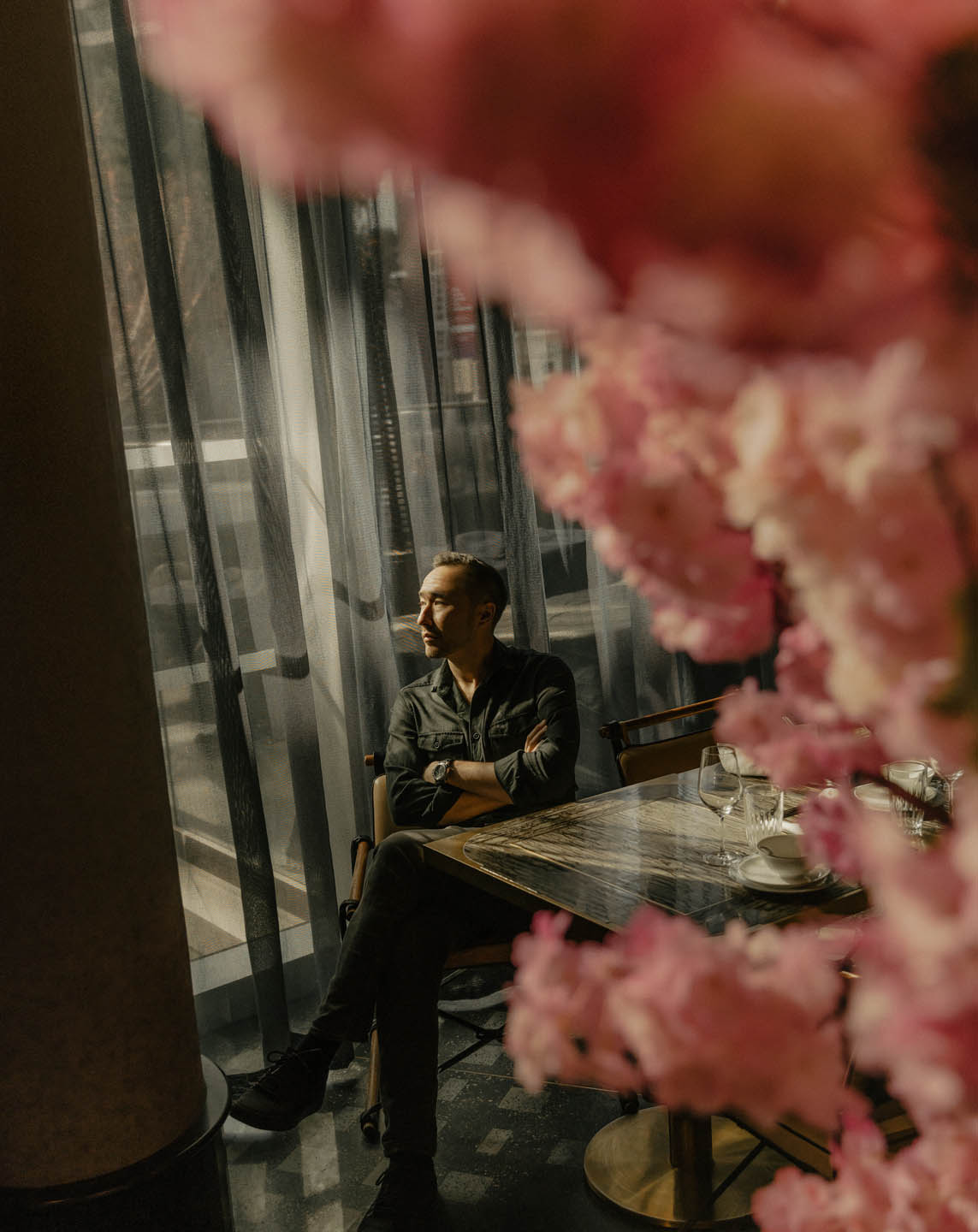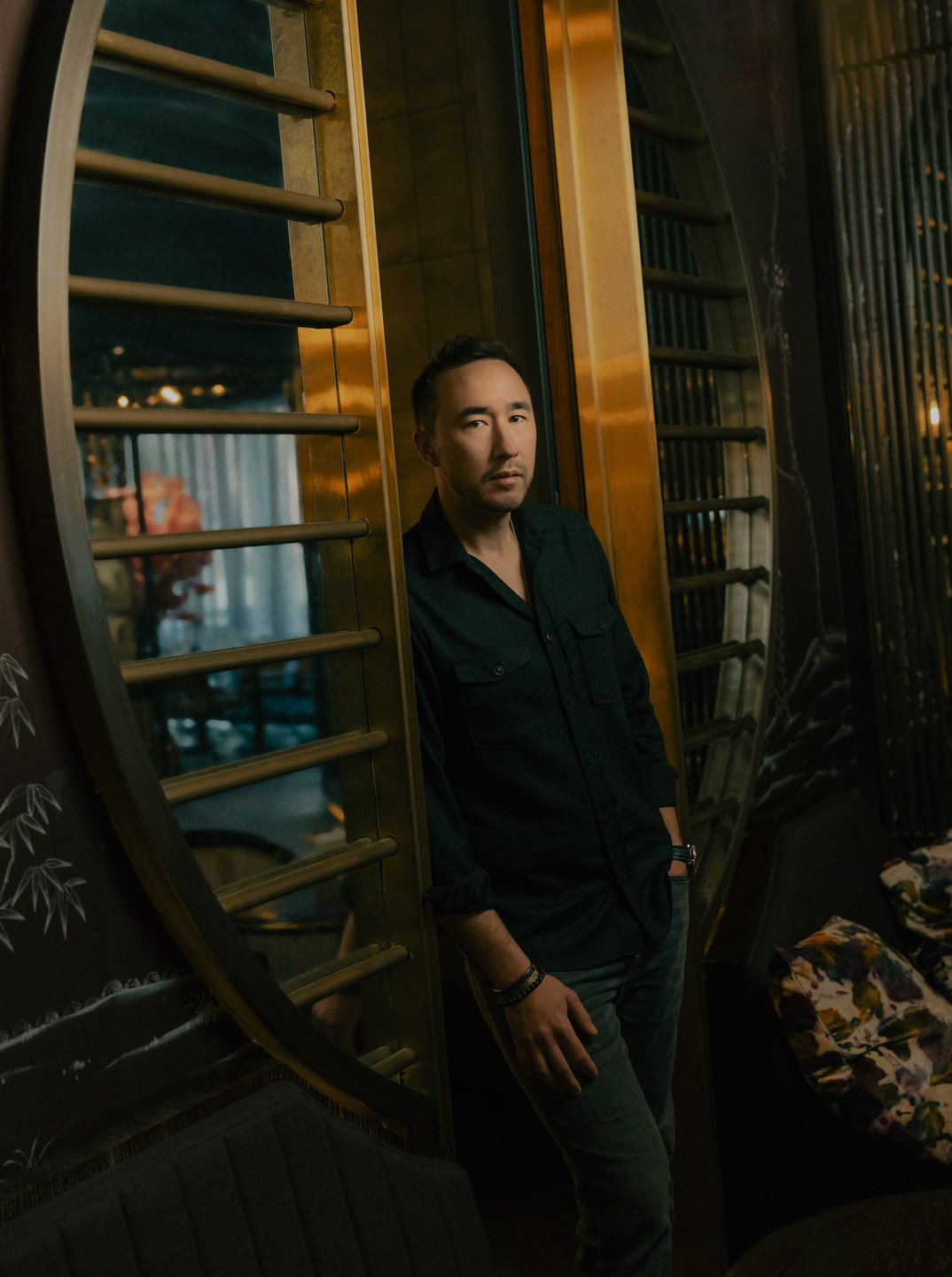On an afternoon last September, the cold, bright sun shone through a web of clouds onto the twin jagged peaks of Manaslu, the Nepalese mountain of the soul, and all eyes were on Nirmal “Nims” Purja. A legendary elite climber who summitted the world’s 14 highest peaks in a record six months and six days, he was there to prove it was possible to paraglide from the Manaslu base camp nearly 5,000 metres above sea level—a feat for which he had sought special permission from Nepal’s government—and to open up new vistas for the country’s tourism industry.
His first flight down the mountain had been a success, his white-and-red paraglider hanging in the sky for eight minutes down a long, lush, curved Himalayan valley to the village of Samagau. Floating with him was one of his trainers, a British Chinese paragliding expert named Malcolm Wood, in a black Arc’teryx puffer jacket and similarly branded white-and-blue paraglider.
For his second flight of the day, Purja set himself up on the jagged rocky slope above base camp, opened his paraglider, and launched himself into the sparse air. He was unlucky. Wind caught the glider and sent him tumbling onto the rocks, injuring his back. Wood helped Purja reset immediately, and the climber took flight—making it back down to Samagau before he was airlifted to Kathmandu for medical attention. He and Wood were back on the mountain the next day, climbing onto the shoulders of Manaslu to ski down amidst whiteout snow.
This sort of thing is, to Wood, a side note—a story he tells casually while hanging out in the atrium of his downtown restaurant. He is, on the surface, exactly the kind of person you expect a dashing 41-year-old entrepreneur philanthropist paragliding instructor to be. He’s opened more than 40 restaurants around the world, and his creative studio Maximal Concepts has planted its flagship brand, Mott 32, in Vegas, Cebu, Bangkok, Dubai, Singapore, Seoul, Hong Kong, and Vancouver. Toronto is on the way. It’s one of the few top-shelf Chinese restaurant brands to make the leap to the international market.
Then he’s an ecological campaigner. He runs a company that develops sustainable products for the hospitality industry, such as bamboo hand towels and compostable cling film. He assiduously offsets the carbon emissions of his far-flung business flights. He eats mostly plants, as do his wife and three children, who have all been weathering the pandemic in a house with a vegetable garden in the French Alps.
He was recently named a mountain advocate by the United Nations Environment Programme, and in a new Imax film he flies high-speed paragliders down receding glaciers to thrillingly illustrate the impacts of climate change.

Yes, there’s also the whole international paragliding athlete thing. As a mountain climbing adventurer, he’s a brand ambassador for Vancouver’s Arc’teryx, as well as the luxury Swiss watch brand Vacheron Constantin. He likes to throw himself off Mont Blanc strapped to skis and a translucently thin nylon wing for fun.
If this were all you knew about Wood, you might take away a picture of steely self-confidence and unflinching ethical certitude. And yet, as Wood and I walk along the Vancouver seawall, geese honking over the narrow wedge of harbour between us and his restaurant, he begins a spontaneous negotiation with himself.
Sure, he tries to be sustainable, he says in the voice of his internal skeptic, but sometimes the restaurant has to use plastic. Yes, he thinks people should eat less meat, but there’s still plenty on the Mott 32 menu. Yes, he buys carbon offsets for his flights, but he knows that most people can’t or won’t.
Then he replies to himself, this time in his voice of compromise. “You know, we’re all part of the problem,” he says. “Everyone drives a car. You can catch the bus and criticize the guy driving his car, but then you’re still flying home to see your parents. It’s a can of worms. The restaurant isn’t sustainable at the end of the day—nothing is. But if I don’t try, I lose my ability to influence and try to change people’s minds, right? And then someone else steps in and doesn’t even try.”
Wood sees himself not as an environmental activist or ideologue but as a negotiator and persuader. He believes industrial food systems are broken, microplastics are poisoning our bodies, and climate change is threatening the Earth. But he’d rather be on the inside nudging the levers of power than on the outside banging on the gates. And if he makes some money along the way, that’s all the more to invest into environmental documentaries and cling-film startups.
“When you try to do something good, people criticize what you do bad. When you don’t do anything, you can’t get criticized. So most people don’t want to try.”
Malcolm Wood is not particularly easy to criticize. He’s successful, thoughtful, and well dressed, and he spends much of his time trying to make the world a better place. But one of the most interesting things about him is that he still has doubts—or at least a need to explain to himself that a businessman really can make a difference.
“If you want me to be super environmental, close everything down, leave the city, go into a log cabin, get a freehold piece of land, and put my head in the sand,” he tells me, in response to absolutely nobody but himself, “yeah, as an individual I’ll create less of an environmental impact. But I’ll have less influence over everyone else, and I won’t be able to help.”
For Wood, Mott 32 is a stage on which he performs nightly to a thousand receptive palates, including famously meat-loving Chinese diners. Each performance is an opportunity to change minds. “We can do things differently,” he says. “There’s still meat on the menu, but what we’re doing is educating. Like, we’re slowly saying, ‘Here’s an alternative, try this. Do you like it?’ And if we do that with enough people, maybe eventually we can take off the meat dish. But we can’t do that today. Otherwise we’d go bankrupt, and then we’d also lose our influence.”
“Chinese culture is extremely traditional. They don’t like to mess with tradition, and they don’t like to undermine elders. And here we were doing both of those things.”
Mott 32, as well as his soapbox, is a creature of Wood’s bicultural upbringing. He followed his Chinese businesswoman mother around postings in Taiwan, Hong Kong, and Vancouver, living in 12 countries by his mid-20s. He also learned to ski and hike with his English father, and eventually studied mathematics, physics, and then financial law. It was at university that he met his two business partners, one English and one Chinese, for whom Wood is the uniting middle. Wood credits his ability to walk in both worlds—the casual anglophone offices of Western hospitality and the traditional hierarchies of a Mandarin-speaking kitchen—for breaking Mott 32 out of Hong Kong and into cities around the world.
“Chinese culture is extremely traditional. They don’t like to mess with tradition, and they don’t like to undermine elders. And here we were doing both of those things,” he says.
The Vancouver restaurant is an old postcard from an imagined Hong Kong that never quite existed—a richly textured octagon of dark polished wood, rattan, hanging birdcages, and rusted mailboxes. The menu pairs elegant Beijing roast duck with rustic, Sichuan-inflected stir-fried spicy duck bones, and Cantonese dim sum served iconoclastically at dinner. Homey Chinese techniques are layered with eye-catching imported ingredients in barbecued Ibérico pork and Japanese Wagyu sauteed with string beans, served with zinging acidic European wines to cut through the rich flavours. Then there are the vegetarian dishes: smoked imitation cod made with pea protein, lion’s mane mushroom meatballs, and vegetarian siu mai.
This is Wood’s charm offensive, his strategy to catch flies with vinegar, honey, and a dash of chili pepper. Is it environmentally impeccable? No. Wood is the first to admit it. But imperfection, he believes, is an acceptable cost of persuasion.
“If you protest on the outside, you get people who are abrasive, it’s head-to-head,” he says. “Then people feel like they can’t change, and they’re less likely to stand up for anything because they feel like they’re going to get attacked. That model to me doesn’t feel like the way to approach things.”
Then Wood pauses, changes his mind, and once again compromises with himself. “We need all of it. We need people protesting on the outside, and people trying to do it from the inside.”
Assistant photographer Marlin Olynyk. Read more from our Summer 2023 issue.









